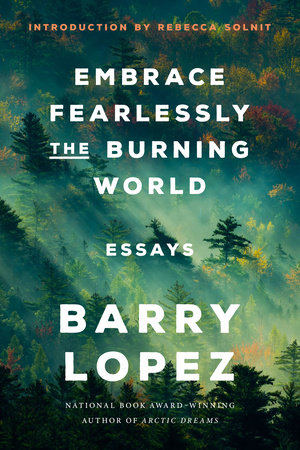Embrace Fearlessly the Burning World
Essays
Barry Lopez
Paperback
August 8, 2023 | ISBN 9780593242841
Hardcover
May 31, 2022 | ISBN 9780593242827
Ebook
May 31, 2022 | ISBN 9780593242834
Audiobook Download
May 31, 2022 | ISBN 9780593605806
About the Book
NEW YORK TIMES EDITORS’ CHOICE • A “lyrical” (Chicago Tribune) final work of nonfiction from the National Book Award–winning author of Arctic Dreams and Horizon, a literary icon whose writing, fieldwork, and mentorship inspired generations of writers and activists.
“Mesmerizing . . . a master observer . . . whose insight and moral clarity have earned comparisons to Henry David Thoreau.”—The Wall Street Journal
ONE OF THE TEN BEST BOOKS OF THE YEAR: Outside
ONE OF THE BEST BOOKS OF THE YEAR: The New York Times
An ardent steward of the land, fearless traveler, and unrivaled observer of nature and culture, Barry Lopez died after a long illness on Christmas Day 2020. The previous summer, a wildfire had consumed much of what was dear to him in his home place and the community around it—a tragic reminder of the climate change of which he’d long warned.
At once a cri de coeur and a memoir of both pain and wonder, this remarkable collection of essays adds indelibly to Lopez’s legacy, and includes previously unpublished works, some written in the months before his death. They unspool memories both personal and political, among them tender, sometimes painful stories of his childhood in New York City and California, reports from expeditions to study animals and sea life, recollections of travels to Antarctica and other extraordinary places on earth, and meditations on finding oneself amid vast, dramatic landscapes. He reflects on those who taught him, including Indigenous elders and scientific mentors who sharpened his eye for the natural world. We witness poignant returns from his travels to the sanctuary of his Oregon backyard, adjacent to the McKenzie River. And in prose of searing candor, he reckons with the cycle of life, including his own, and—as he has done throughout his career—with the dangers the earth and its people are facing.
With an introduction by Rebecca Solnit that speaks to Lopez’s keen attention to the world, including its spiritual dimensions, Embrace Fearlessly the Burning World opens our minds and souls to the importance of being wholly present for the beauty and complexity of life.
“This posthumously published collection of essays by nature writer Barry Lopez reveals an exceptional life and mind . . . While certainly a testament to his legacy and an ephemeral reprieve from his death in 2020, this book is more than a memorial: it offers a clear-eyed praxis of hope in what Lopez calls this ‘Era of Emergencies.’”—Scientific American
“Mesmerizing . . . a master observer . . . whose insight and moral clarity have earned comparisons to Henry David Thoreau.”—The Wall Street Journal
ONE OF THE TEN BEST BOOKS OF THE YEAR: Outside
ONE OF THE BEST BOOKS OF THE YEAR: The New York Times
An ardent steward of the land, fearless traveler, and unrivaled observer of nature and culture, Barry Lopez died after a long illness on Christmas Day 2020. The previous summer, a wildfire had consumed much of what was dear to him in his home place and the community around it—a tragic reminder of the climate change of which he’d long warned.
At once a cri de coeur and a memoir of both pain and wonder, this remarkable collection of essays adds indelibly to Lopez’s legacy, and includes previously unpublished works, some written in the months before his death. They unspool memories both personal and political, among them tender, sometimes painful stories of his childhood in New York City and California, reports from expeditions to study animals and sea life, recollections of travels to Antarctica and other extraordinary places on earth, and meditations on finding oneself amid vast, dramatic landscapes. He reflects on those who taught him, including Indigenous elders and scientific mentors who sharpened his eye for the natural world. We witness poignant returns from his travels to the sanctuary of his Oregon backyard, adjacent to the McKenzie River. And in prose of searing candor, he reckons with the cycle of life, including his own, and—as he has done throughout his career—with the dangers the earth and its people are facing.
With an introduction by Rebecca Solnit that speaks to Lopez’s keen attention to the world, including its spiritual dimensions, Embrace Fearlessly the Burning World opens our minds and souls to the importance of being wholly present for the beauty and complexity of life.
“This posthumously published collection of essays by nature writer Barry Lopez reveals an exceptional life and mind . . . While certainly a testament to his legacy and an ephemeral reprieve from his death in 2020, this book is more than a memorial: it offers a clear-eyed praxis of hope in what Lopez calls this ‘Era of Emergencies.’”—Scientific American
Read more
Close




